

Russia/Ukraine/ex-USSR - Chernobyl roof collapse worries activists. Hydrogen Fix For Japanese Nuclear Reactors Eurasia Review. By World Nuclear News Areva is to fit all 23 Japanese pressurized water reactors with hydrogen recombiners that help to prevent the explosive gas building up in emergency situations. The French company announced a contract to provide a bulk order of its passive autocatalytic recombiners. The devices use catalytic oxidation to turn traces of hydrogen into steam, a process that works constantly and requires no power. Albert Einstein Archives in Jerusalem. In his will Albert Einstein ordered that his secretary Helen Dukas (1896-1982) and Dr.
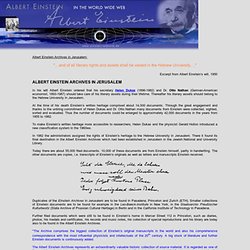
Otto Nathan (German-American economist, 1893-1987) should take care of his literary assets during their lifetime. Thereafter his literary assets should belong to the Hebrew University in Jerusalem. At the time of his death Einstein’s written heritage comprised about 14,000 documents. Through the great engagement and thanks to the untiring commitment of Helen Dukas and Dr. Otto Nathan many documents from Einstein were collected, sighted, sorted and evaluated. To make Einstein’s written heritage more accessible to researchers, Helen Dukas and the physicist Gerald Holton introduced a new classification system in the 1960ies. Nuclear Engineering International. Omaha Public Power District (OPPD) has announced an operating services agreement with Exelon Generation, LLC for the management of Fort Calhoun’s nuclear operations for up to the duration of its operating licence, which is due to expire in September 2033.
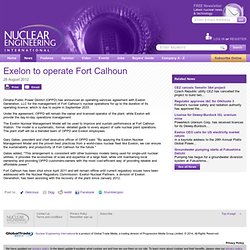
Under the agreement, OPPD will remain the owner and licensed operator of the plant, while Exelon will provide the day-to-day operations management. The Exelon Nuclear Management Model will be used to improve and sustain performance at Fort Calhoun Station. The model is a systematic, formal, detailed guide to every aspect of safe nuclear plant operations. The plant staff will be a blended team of OPPD and Exelon employees. Fukushima Daiichi Nuclear Plant Weekly Review - Nuclear Power Industry News - Nuclear Power Industry News - Nuclear Street - Nuclear Power Portal.
بین تھامس Бен Томас بن توماس בן טאמעס โทมัสเบน Key interests: Community Interests, including Comunity development.
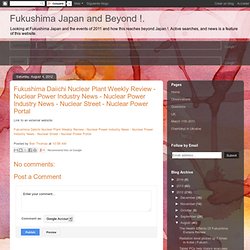
I am also Interested in: Heritage, Culture, and History. Especially that in and around Cardiff UK. I find the Environment and Energy issues an interesting challenge !. I am also interested in the developing, "International Global Village". Fukushima Meltdown Hastens Decline of Nuclear Power. Nuclear accidents likely 'every ten to twenty years' Catastrophic nuclear accidents such as the core meltdowns at Chernobyl and Fukushima are 200 times more likely to happen than previously believed, say scientists.
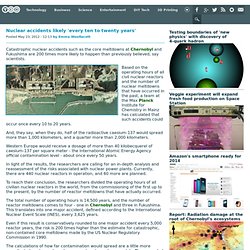
Based on the operating hours of all civil nuclear reactors and the number of nuclear meltdowns that have occurred in the past, a team at the Max Planck Institute for Chemistry in Mainz has calculated that such accidents could occur once every 10 to 20 years. And, they say, when they do, half of the radioactive caesium-137 would spread more than 1,000 kilometers, and a quarter more than 2,000 kilometers. Western Europe would receive a dosage of more than 40 kilobecquerel of caesium-137 per square meter - the International Atomic Energy Agency official contamination level - about once every 50 years. Nuclear meltdowns 200x more likely than previously estimated. Catastrophic nuclear accidents such as the core meltdowns in Chernobyl and Fukushima are more likely to happen than previously assumed.
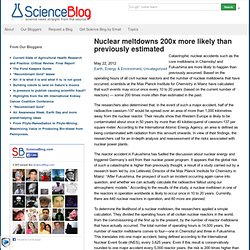
Based on the operating hours of all civil nuclear reactors and the number of nuclear meltdowns that have occurred, scientists at the Max Planck Institute for Chemistry in Mainz have calculated that such events may occur once every 10 to 20 years (based on the current number of reactors) — some 200 times more often than estimated in the past. The researchers also determined that, in the event of such a major accident, half of the radioactive caesium-137 would be spread over an area of more than 1,000 kilometres away from the nuclear reactor.
Their results show that Western Europe is likely to be contaminated about once in 50 years by more than 40 kilobecquerel of caesium-137 per square meter. According to the International Atomic Energy Agency, an area is defined as being contaminated with radiation from this amount onwards. Newswire - Fukushima Meltdown Hastens Decline of Nuclear Power. Fukushima Meltdown Hastens Decline of Nuclear Power J.

Matthew Roney, Earth Policy Category: Investment, Energy Ideas get bigger when you share them... News about Earth Policy May 22, 2012 (Investorideas.com Newswire) Earth Policy Reports: On May 5, 2012, Japan shut down its Tomari 3 nuclear reactor on the northern island of Hokkaido for inspection, marking the first time in over 40 years that the country had not a single nuclear power plant generating electricity. Prior to the Fukushima crisis, Japan had 54 reactors providing close to 30 percent of its electricity, with plans to increase this share to more than 50 percent by 2030.
Next to Japan , the most dramatic shift in nuclear energy policy following Fukushima occurred in Germany . Bob Burnett: Two Meltdowns: Fukushima and the US Economy. More than a year after a tsunami swamped the Fukushima-Daiichi nuclear power plants, the radiation peril continues -- reactor 4 is teetering on the edge of collapse, which would force the evacuation of one-third of Japan's population.
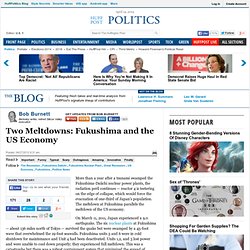
The meltdown at Fukushima parallels the meltdown of the US economy. On March 11, 2011, Japan experienced a 9.0 earthquake.
Gregory Jaczko Resigns as Chairman of Nuclear Commission. U.S.
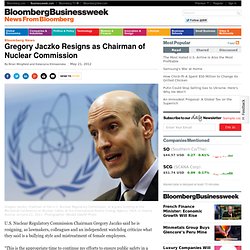
Nuclear Regulatory Commission Chairman Gregory Jaczko said he is resigning, as lawmakers, colleagues and an independent watchdog criticize what they said is a bullying style and mistreatment of female employees. “This is the appropriate time to continue my efforts to ensure public safety in a different forum,” Jaczko said today in a statement. “My responsibility and commitment to safety will continue to be my paramount priority after I leave the commission and until my successor is confirmed.” In an interview, he said disputes with NRC colleagues weren’t a reason for his decision. Jaczko, 41, whose term expires in June 2013, has been faulted for his management by other commissioners and in a report by the agency inspector general last year.
IAEA Says Fukushima Daiichi Power Plant Suffered A Meltdown. Socratic WarningNewsroom MagazineMay ChallengeOr DemandCritical Thinking The intellectual roots of critical thinking date back to the Greek philosophers. Socrates discovered, by means of probing questions, that in the exchange of competing ideas, people sometimes make confident claims based on unreliable assumptions or failed logic. Such arguments, he discovered, were either erroneous in fact, absent sufficient foundation, or failing in logic.
Instead, most arguments were based on confused meanings, inadequate evidence, or contradictory beliefs. The human cost of the Fukushima meltdowns, one year later. Well, I guess this will all serve as a spur for Japan to invest even more money in alternatives like geothermal, wind and solar—which actually they've been heavily investing in for many decades now.
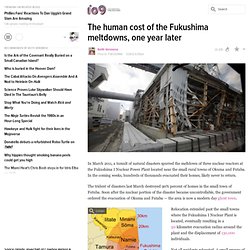
I don't think Japan will ever be able to totally abandon nuclear energy despite the current outcrys in the country to do just that. Given the long history of earthquakes and vulcanism in Japan, there really aren't that many totally stable places to build new reactors. New reactors must be designed to expect some kind of earthquake related disaster to happen at some point. But really, the long term thing to learn here? All old nuclear power planets must be constantly rebuilt and refurbished with new technology to keep them safe when every new disaster teaches us something new. Japanese Officials Knew of Imminent Meltdown Shortly After Tsunami. As Japan and the world prepare for tomorrow's one-year anniversary of the Fukushima disaster, government documents have been released revealing that top Japanese officials were directly warned of an imminent meltdown at the Nuclear plant but failed to take action and denied any such risks to the public.
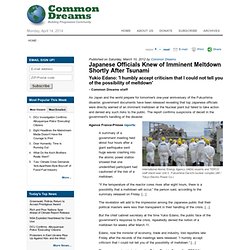
The report confirms suspicions of deceit in the government's handling of the disaster. International Atomic Energy Agency (IAEA) experts and TEPCO staff stand near Unit 3 , Fukushima Dai-ichi nuclear complex (AP / Tokyo Electric Power Co.) PBS Newshour: Cesium killed pine trees as far as you can see — Are there animals that can live here? No, no. Meltdown intel emerges ahead of Japan anniversary. TEPCO sued over Fukushima meltdown - World. Updated Tue 6 Mar 2012, 10:04am AEDT A group of shareholders is suing former and current directors of the Tokyo Electric Power Company (TEPCO) for more than $60 billion over the Fukushima nuclear meltdowns. The 42 TEPCO shareholders say the company knew from modelling estimates that a tsunami of more than 15 metres in height could strike the Fukushima nuclear plant. But they say the company ignored the estimates and did nothing to raise the breakwater protecting the plant. They are seeking to have 27 former and current TEPCO directors pay $62 billion in damages, in what could be the largest civil damages suit in Japanese history.
Inside Japan's Nuclear Meltdown, one year later: Frontline doc airs tonight on PBS. Tour inside meltdown zone of Fukushima Nuclear Plant. (NECN/CNN: Kyung Lah) - It's been almost a year since the disaster at the Fukushima nuclear power plant. CNN was allowed inside the complex, and Kyung Lah reports from the meltdown zone. Fukushima 'remains fragile' nearly a year after meltdown. The operators have installed multiple backup power supplies, a cooling system and equipment to process massive amounts of contaminated water that leaked from the damaged reactors. Inside Japan's Nuclear Meltdown. Aired: 02/28/201254:40Rating: NR. Firms fear summer meltdown in nuclear-free Japan (via AFP) Full Story. What Happens During a Nuclear Meltdown?: Scientific American. Highly Radioactive Cars Being Sold Illegally in Japan. Japan’s last reactor to shut down, leaving country nuclear-free for first time since 1966.
Home | Services | Archive | Partners | Banners | Radio Adds | About Us | Disclaimer | Contacts | © 2014 FOCUS Information Agency The content published by Focus Information Agency and the technologies, used on its website, are protected by the Copyright and Neighbouring Rights Act. All the text, audio and video materials, photos, and graphics, published in the database, are property of Focus Information Agency, unless otherwise provided. Dr Rima Recommends<br />Natural Solutions for a Weaponized World…
For Emerald Essentials questions or issues related to shipments or billing, please contact Customer Service during normal business hours M-F 9am – 4pm Mountain: 866 530 7223 / support@emeraldexpress.net. India can build nuclear reactors for $1700 per kilowatt. Lessons to learn about nuclear power, one year after Fukushima crisis. Day after day in the tsunami's wake, one reactor after another failed at the Fukushima nuclear power plant. U.S. Nuclear Agency Suffers Leadership Meltdown. Hide captionNuclear Regulatory Commission Chairman Chairman Gregory Jaczko (center) speaks Wednesday during a meeting of the House Oversight and Government Reform Committee.
His fellow commissioners, from bottom left: Kristine Svinicki, William Magwood IV and William Ostendorff. Chip Somodevilla/Getty Images Nuclear Regulatory Commission Chairman Chairman Gregory Jaczko (center) speaks Wednesday during a meeting of the House Oversight and Government Reform Committee. His fellow commissioners, from bottom left: Kristine Svinicki, William Magwood IV and William Ostendorff.